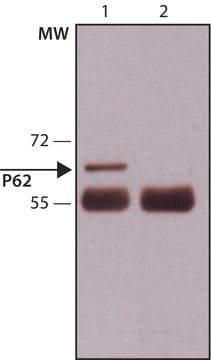P0067
Anti-p62/SQSTM1 antibody produced in rabbit
~1 mg/mL, affinity isolated antibody, buffered aqueous solution
Sinónimos:
Anti-Sequestosome 1, Anti-Ubiquitin-binding p62
About This Item
IP
WB
indirect immunofluorescence: 1-2 μg/mL using human A549 cells
western blot: 1-2 μg/mL using whole extracts of rat PC12 cells
Productos recomendados
biological source
rabbit
Quality Level
conjugate
unconjugated
antibody form
affinity isolated antibody
antibody product type
primary antibodies
clone
polyclonal
form
buffered aqueous solution
mol wt
antigen ~62 kDa
species reactivity
human, rat, mouse
packaging
antibody small pack of 25 μL
concentration
~1 mg/mL
technique(s)
immunoprecipitation (IP): 1-2 μg using lysate of NIH-3T3 cells
indirect immunofluorescence: 1-2 μg/mL using human A549 cells
western blot: 1-2 μg/mL using whole extracts of rat PC12 cells
UniProt accession no.
shipped in
dry ice
storage temp.
−20°C
target post-translational modification
unmodified
Gene Information
human ... SQSTM1(8878)
mouse ... Sqstm1(18412)
rat ... Sqstm1(113894)
General description
Anti-p62/SQSTM1 is produced in rabbit using as immunogen a synthetic peptide corresponding to amino acids of human p62/SQSTM1 (GeneID: 8878), conjugated to KLH. The corresponding sequence is identical in rat and mouse. The antibody is affinity-purified using the immunizing peptide immobilized on agarose.
Specificity
Immunogen
Application
- western blotting
- immunoprecipitation in human cell lines
- Immunohistochemistry prostatectomy specimens
Biochem/physiol Actions
Mutations in this gene result in sporadic and familial Paget disease of bone. p62 is commonly found in inclusion bodies containing polyubiquitinated protein aggregates, that accumulate in several degenerative diseases. Autophagy is involved in cellular clearance of these protein aggregates. Autophagy plays an essential role in cellular differentiation, cell death, and aging. Defective autophagy may contribute to certain human diseases such as cancer, neurodegenerative diseases, muscular disorders, and pathogen infections.
Physical form
Storage and Stability
Disclaimer
¿No encuentra el producto adecuado?
Pruebe nuestro Herramienta de selección de productos.
Storage Class
10 - Combustible liquids
flash_point_f
Not applicable
flash_point_c
Not applicable
ppe
Eyeshields, Gloves, multi-purpose combination respirator cartridge (US)
Elija entre una de las versiones más recientes:
Certificados de análisis (COA)
¿No ve la versión correcta?
Si necesita una versión concreta, puede buscar un certificado específico por el número de lote.
¿Ya tiene este producto?
Encuentre la documentación para los productos que ha comprado recientemente en la Biblioteca de documentos.
Los clientes también vieron
Nuestro equipo de científicos tiene experiencia en todas las áreas de investigación: Ciencias de la vida, Ciencia de los materiales, Síntesis química, Cromatografía, Analítica y muchas otras.
Póngase en contacto con el Servicio técnico














